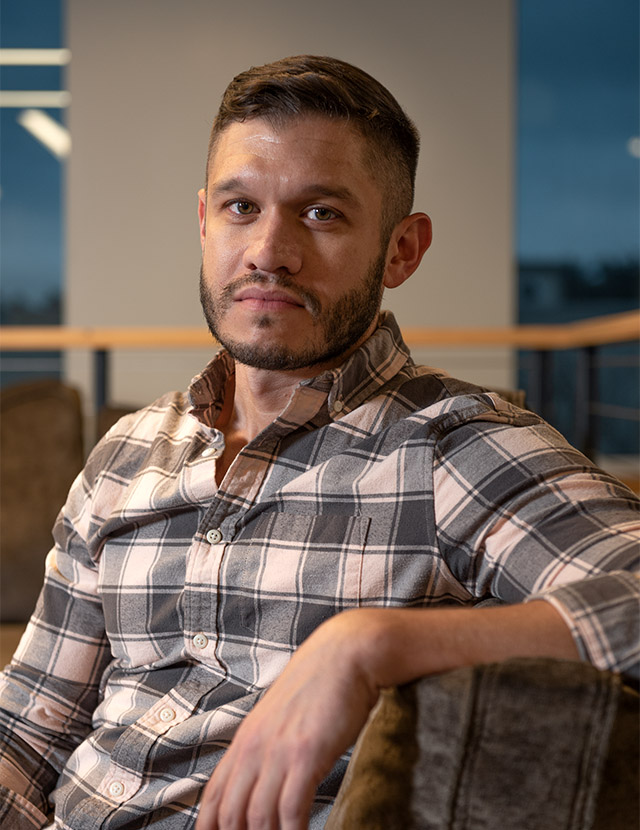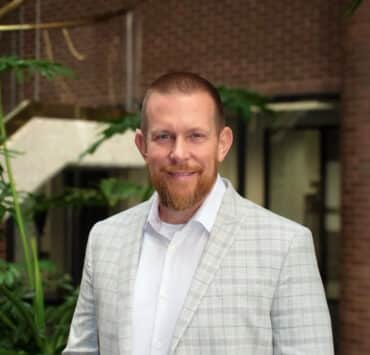
Early in Nate Mark’s career, an understanding of what he didn’t want to do was as valuable as knowing which career path he wanted to follow. It’s a virtue that, after pursuing a variety of studies and working in different fields, serves him well today in a company that operates at the intersection of law, healthcare, and technology.
Mark arrived at the University of South Carolina in 2001, excited to convert his childhood interests in math and science into a chemical engineering degree. The program included not only the typical technical courses, but also brief glimpses into how he could use his studies in after graduation. But nothing seemed to call to him—until one afternoon, when he decided to attend a presentation on campus. The speaker, a law student currently working at the school’s intellectual property office, and his future boss, happened to also have a chemical engineering degree.
“He talked about the intersection of law and engineering and how the two can work together,” Mark says. “I found that very interesting. I thought, ‘Maybe that’s what I want to do with my chemical engineering degree.’”
“My measure of success is winning the ears of the executive leadership through being a trusted counsel, advisor, and business partner.”
Nate Mark
Soon after, he sat for the LSAT and enrolled in law school at the University of South Carolina, beginning classes just a short time after graduation. While there, he became the vice president of the school’s Intellectual Property Law Society. “Growing up, I never considered myself going into the legal field,” he says. “Yet, by then, I thought I was going down the road of being a patent attorney.”
But after additional course work in law school and clerking in the world of intellectual property law, another pivot was in order. “Patent prosecution isn’t for everyone,” he says. “I knew that it probably wasn’t the career fit for me.”
So, Mark began his legal career working in private practice with a focus on healthcare litigation specifically, defending physicians and hospital systems against medical malpractice claims. While there, he was also exposed to a variety of commercial, insurance, and personal injury litigation, as well as commercial transactions.
He soon found he preferred transactional work over litigation and quickly moved into a role as transactional attorney for healthcare and technology clients where he began to develop a deep knowledge of the healthcare and technology industry.
Mark continued to build his legal resume with two other successful terms as in-house counsel where he refined his skills as a corporate attorney, including serving as corporate secretary. All these experiences have proven incredibly valuable as the general counsel of RedSail Technologies, a role he assumed in June 2020, soon after the company’s launch.
“It is invaluable for any attorney who goes in-house to have a foundation in litigation because you understand how litigants and court systems actually operate—what is going through plaintiffs’ and defendants’ minds,” he says. “You are in a much better position to counsel your business counterparts and advise them on risks with the understanding of real-world legal implications.”
RedSail Technologies provides pharmacy management software and related services to more than ten thousand independent pharmacies, small chains, and healthcare systems across the country, reaching over eight million patients. The company’s technology facilitates the filing of pharmacy claims and prescription fills electronically, and RedSail offers tools for the businesses to connect with their customers which improves adherence, patient care, and outcomes.
As general counsel, Mark oversees all the legal and compliance aspects of the business with a key focus on commercial transactions, HIPAA compliance, and the evolving data privacy and security laws and regulations on the state and federal level. Keeping up within an “ever-changing regulatory environment” related to personal health data is almost always at the top of his mind, he says, and it’s a challenge for which his diverse background prepared him well.
“Engineering is very analytical, you’re thinking through steps to solve a problem or design a product,” he says. “You can apply those same principles, just in the context of law.” This background is especially helpful as he works with RedSail’s leadership to incorporate various forms of machine learning into the company’s offerings.
It’s a small team—Mark oversees another attorney, a legal assistant, and a paralegal with a “hands-off approach,” allowing them “to grow in their roles.” Despite the lean personnel, they’ve made big impacts. Having acquired three companies in the past four years, Mark is proud to have overseen these acquisitions and led integration efforts to streamline RedSail’s legal operations to service a growing business while minimizing risk.
“It is invaluable for any attorney who goes in-house to have a foundation in litigation because you understand how litigants and court systems actually operate—what is going through plaintiffs’ and defendants’ minds.”
Nate Mark
But he doesn’t only measure success by the risk he helps RedSail avoid. He takes pride in being flexible and finding ways to help new projects develop. “As the general counsel, my job is not to be the ‘Department of No,’” he says. “Rather, I want to be successful in finding ways to say ‘yes,’ designing creative solutions that drive the company forward.” The key to being effective in business is knowing your client, he advises.
Away from Redsail, creative solutions for Mark take the unique form of customized pottery for canines. He’s a board member of Cups4K9s, a nonprofit organization that raises money to help secure permanent homes for retired police and military dogs, typically Dutch Shepherds and Belgian Malinoises. “Most people don’t know this, but when those animals retire, their handler is usually responsible for their housing, food, medical bills, and everything else,” he says. “It can get quite expensive.”
Mark says that accumulating experience and being reliable and open are fruitful goals for young students and workers. “My measure of success is winning the ears of the executive leadership through being a trusted counsel, advisor, and business partner.”
Health Law Strategists (HLS) is proud of our partnership with Nate Mark and the RedSail Technologies’ (RST) team. Working with RST has allowed HLS to showcase our expertise as a leader in navigating the legal challenges that present at the intersection of healthcare and technology. HLS attorneys routinely counsel healthcare entities across the healthcare continuum, from digital health and technology-enabled services companies to large integrated payor/provider systems, on complex state and federal laws and regulations. We also assist our clients in determining the optimal structure for strategic transactions, alignments, joint venture arrangements, as well as other affiliations and partnerships.



